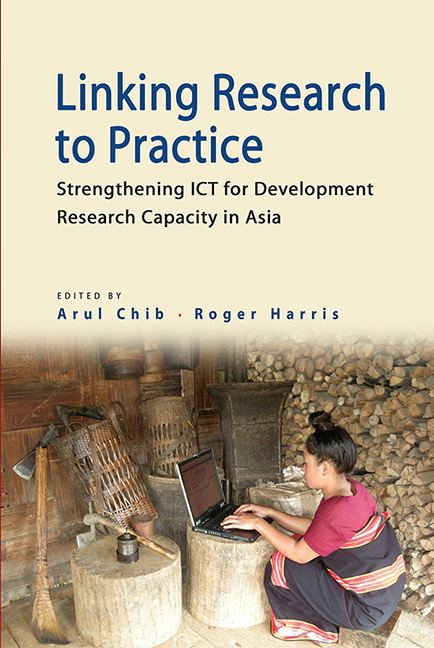Book contents
- Frontmatter
- Contents
- List of Tables
- List of Figures
- Foreword
- Preface
- Acknowledgement
- SECTION I MANAGEMENT PERSPECTIVES: INSIDERS' THOUGHTS ON THE PROGRAMME
- SECTION II RESEARCH PERSPECTIVES: THEORETICAL REFLECTIONS BY EXPERTS
- SECTION III RESEARCH OUTPUTS
- 11 It's the Talk, Not the Tech: What Governments Should Know about Blogging and Social Media
- 12 Integrating Digital and Human Data Sources for Environmental Planning and Climate Change Adaptation: From Research to Practice in Central Vietnam
- 13 The Challenge of Working Across Contexts and Domains: Mobile Health Education in Rural Cambodia
- 14 The Dynamics and Challenges of Academic Internet Use Amongst Cambodian University Students;
- SECTION IV SYNTHESIS AND CONCLUSION
- About the Contributors0
- Index
13 - The Challenge of Working Across Contexts and Domains: Mobile Health Education in Rural Cambodia
from SECTION III - RESEARCH OUTPUTS
Published online by Cambridge University Press: 21 October 2015
- Frontmatter
- Contents
- List of Tables
- List of Figures
- Foreword
- Preface
- Acknowledgement
- SECTION I MANAGEMENT PERSPECTIVES: INSIDERS' THOUGHTS ON THE PROGRAMME
- SECTION II RESEARCH PERSPECTIVES: THEORETICAL REFLECTIONS BY EXPERTS
- SECTION III RESEARCH OUTPUTS
- 11 It's the Talk, Not the Tech: What Governments Should Know about Blogging and Social Media
- 12 Integrating Digital and Human Data Sources for Environmental Planning and Climate Change Adaptation: From Research to Practice in Central Vietnam
- 13 The Challenge of Working Across Contexts and Domains: Mobile Health Education in Rural Cambodia
- 14 The Dynamics and Challenges of Academic Internet Use Amongst Cambodian University Students;
- SECTION IV SYNTHESIS AND CONCLUSION
- About the Contributors0
- Index
Summary
ABSTRACT
In general terms, the academic visibility and professional progress of researchers is a process of acculturation and assimilation into specific communities of established researchers and their discourses. Emergent researchers, especially those outside the mainstream of academic institutions and the wider global research community face two problems. Firstly, they are unaware of many of the tacit or assumed expectations, standards and criteria of the global research community. Secondly, this global research community is not monolithic and undifferentiated but is instead composed of many different smaller, and almost mutually exclusive and almost mutually incomprehensible communities. We explore some aspects of this dilemma from the perspective of a specific SIRCA project faced with the discourses of several research communities, those of software development, mobile learning, health education and development studies, and a mentor coming from his own research communities. It becomes apparent that emergent researchers coming from a position of relative isolation need considerable support in deciding the optimal affiliations and associations for their professional development.
INTRODUCTION
Over the last three years, a team at the Royal University of Phnom Penh, Cambodia, working with support and funding from the IDRC SIRCA programme delivered through the Nanyang Technological University's SiRC in Singapore, has worked on a project to enhance health education — specifically sexual and reproductive health education — for rural Khmer youth, exploiting the affordances and ownership of messaging on their lowspecification mobile phones.
The explicit focus of the project in Cambodia and of the programme as a whole has been building research capacity in the poorest countries of South Asia but in fact this specific project and others of its kind stand at the intersection of several different and perhaps divergent or competing discourses. These include the discourses of:
Mobiles-for-health (mHealth), part of a wider mobiles-for-development (m4d) discourse
ICT for ‘development’ (ICTD), part of a wider discourse around both software and hardware technology development and also the problematic concept of ‘development’ itself
[…]
- Type
- Chapter
- Information
- Linking Research to PracticeStrengthening ICT for Development Research Capacity in Asia, pp. 147 - 156Publisher: ISEAS–Yusof Ishak InstitutePrint publication year: 2012

